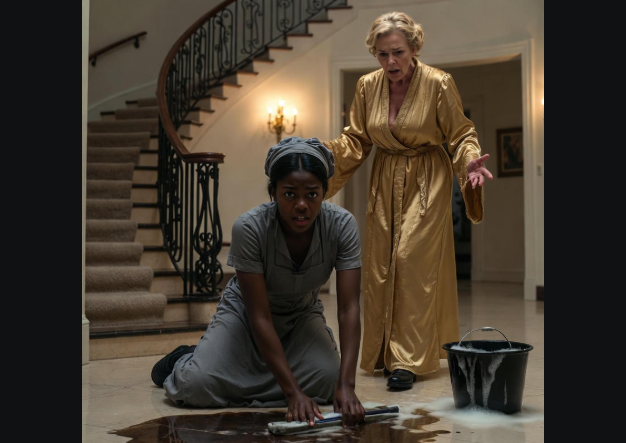No maid ever endured in that house—not a single one. Behind the imposing iron gates and lush, vibrant gardens of the Richards mansion lay a hidden arena of tension. Visitors admired the sparkling chandeliers, elegant fountains, and roses flourishing in every season. Yet the employees spoke in hushed tones about cutting remarks, doors banging shut, and quiet sobs. At the heart of everything was Madame Rose Richards—youthful, stunning, and unrelenting with her words.
In six months, nine maids had departed. Some exited in tears, others shaking. One leaped over the fence without shoes to get away.
Into this residence stepped Naomi Okafor, a reserved woman around thirty years old. She held a simple nylon bag and a fierce parental resolve. She arrived without aiming to dazzle or gain approval. She came because options had vanished. Her daughter Deborah, merely nine, rested in a hospital bed with a weakening heart. Naomi’s path forward depended on keeping this position to cover the medical costs.
On her initial morning, Naomi secured a scarf around her hair and started mopping the expansive marble floor. The home remained quiet until the crisp sound of heels resounded from the staircase.
Madame Rose appeared in a flowing silk robe, her aura dominating the space. Without speaking, she overturned Naomi’s bucket onto the floor. Water spread everywhere, drenching Naomi’s footwear.
“This marks the third occasion someone obstructs my path,” Rose declared icily. “Redo the cleaning.”
Naomi held back her frustration, knelt, and began anew. From the corridor, another worker murmured, “She will not remain.”
Yet Naomi’s sense of dignity had faded away amid hospital hallways, pleading with physicians to rescue her child. She possessed resilience beneath her calm exterior.
The following day, Naomi awakened before sunrise. She cleared the driveway, shined the glass entrances, removed dust from ornate furniture.
In the kitchen, she labored alongside Mama Ronke, the household cook, when Rose requested lemon water. Naomi cut the lemons with precision, steadied the tray, and delivered it upstairs. Rose tasted it, curved her lips slightly, and remarked, “You managed correctly this time.”
As Naomi prepared to exit, Rose’s tone sharpened once more: “A mark remains on the sink. Marks displease me.”
Naomi addressed it immediately. In her rush, she nudged a perfume bottle yet steadied it in time. Rose struck her regardless.
“You lack grace.”
Naomi’s vision blurred with emotion, but she inclined her head. “Forgive me, Ma.”
Unnoticed, Mr. Femi Richards, the wealthy owner, observed from the corridor. His gray gaze warmed at Naomi’s perseverance, though he remained silent.
Naomi had committed herself: she would stay put. Not while Deborah relied on her.
By the third day, the employees observed Naomi with interest. She avoided tears, avoided loud responses, avoided departure. She performed her duties quietly, consistent as flowing water.
Rose intensified her efforts. Naomi’s uniform disappeared, replaced by a delicate nightgown unrelated to her. She emerged in a wrapped cloth and worn shirt. Rose ridiculed her before the group:
“Did you rest in the streets, or does your attire align with the cleaning tools?”
Naomi bowed her head and resumed her tasks.
Then followed deliberate mishaps. Rose poured red wine onto a pale carpet and stepped away. Naomi kneeled, scouring without complaint. On another occasion, Rose shattered a crystal dish and accused Naomi. She responded softly, “I will handle the cleanup, Ma.”
The employees shared uneasy looks. Nobody had persisted this far.
One stormy morning, Naomi walked by a corridor mirror and paused. In the reflection behind her, Rose sat barefoot on the cold marble, makeup running, silk scarf loosening from her hair. She appeared far from regal. She seemed shattered.
Naomi paused, then gently set a folded towel nearby and started to walk away.
“Stop,” Rose murmured, her voice faltering. “Why do you remain?”
Naomi faced her, composed yet direct. “Because necessity demands it. For my daughter. She battles illness, and this role funds her care.”
Rose’s mouth quivered. “You show no fear toward me?”
Naomi moved her head side to side. “Fear once gripped me in everyday challenges. Yet holding your child’s hand in a medical ward changes that—nothing else can shatter you.”
For the initial moment, Rose offered no reply. She viewed Naomi differently now. She recognized a woman bearing wounds as profound as her own.
Following that encounter, the residence transformed. Doors ceased their forceful closures. Commands grew gentler. Rose even uttered a soft “thank you” upon receiving tea from Naomi.
The employees murmured in wonder. “The madam has altered.”
And Naomi understood: she had not merely withstood Rose. She was connecting with her.
One Sunday, Rose presented Naomi with a white envelope. It contained money and a message: For travel. Visit your daughter.
Naomi’s fingers trembled. She hurried to the hospital that afternoon and saw Deborah offering a faint smile. “Mommy, you arrived,” she breathed.
Naomi nourished her carefully and assured, “Soon, my dear. Stay strong.”
What Naomi remained unaware of was that Rose dispatched her driver to trail her. Upon discovering the reality of Deborah’s condition, a change stirred within Rose. For the first time in ages, Rose shed genuine tears.
Days afterward, Rose urged Naomi to accompany her to a women’s gathering. Naomi objected, “Ma, attendance is not possible for me.”
But Rose had selected a modest peach dress and scarf already. At the gathering, Rose presented Naomi not as household help, but as “a resilient woman, a devoted mother.”
There, a physician leading a children’s heart organization requested Deborah’s information.
A week on, Naomi answered a phone call: the organization would cover the procedures entirely—expenses, drugs, follow-up care.
Naomi sank to her knees in the kitchen, emotions flowing freely. The employees clustered around, celebrating with her.
The procedure succeeded. Deborah recovered.
When Naomi returned with her daughter weeks later, the home organized a modest celebration under the mango tree—jollof rice, puff-puff, balloons dancing in the breeze. Rose bent down to Deborah, offered a storybook, and murmured, “Address me as Auntie Rose.”
That very day, Naomi advanced to Head of Household Operations, receiving improved compensation, personal living space, and complete health coverage for Deborah.
Rose stated plainly, “You accomplished what others failed. You did not merely maintain this home—you removed the dread from it.”
Thereafter, Naomi became integral to the Richards mansion.
Femi Richards expressed gratitude for restoring harmony to his residence. The employees held her in high regard. And Rose—formerly known as “Madame Ice”—regarded her as family.
Occasionally, in the evening hours, Rose shared her history. “I served as a maid once. Faced humiliation, rejection. I vowed never to appear vulnerable again. Yet you demonstrated that true strength lies in endurance—not harshness.”
Naomi would offer a gentle smile. “At times, divine paths lead through trials, not to destroy us, but to shape us into beacons for others.”
The mansion that once resounded with harsh words and forceful closures now filled with joy, movement, and vitality.
Naomi had entered carrying a nylon bag and a mother’s urgent need. Through persistence, she had reshaped it all.
She triumphed without raising her voice. She triumphed through unwavering presence.
And through that, she mended not only her daughter—but the whole household.







